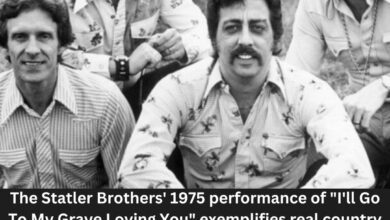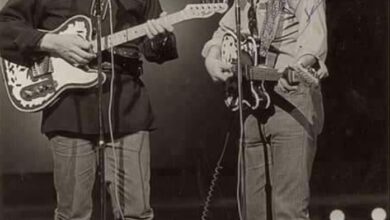His voice is commanding, demonstrating incredible talent and proficiency. His music will endure for ages
Elvis Presley’s performance of “You Gave Me a Mountain” during the Aloha from Hawaii concert on January 14, 1973, remains one of the most poignant and powerful moments in his career. The song, penned by Marty Robbins, is a testament to resilience and struggle, themes that resonated deeply with Elvis, particularly as he faced various personal and professional challenges during this period.
The Song’s Background and Significance
“You Gave Me a Mountain” was originally written and recorded by Marty Robbins in 1970. The song reflects a sense of triumph over adversity, with lyrics that speak to the trials of life and the perseverance required to overcome them. Robbins, a revered figure in country music, imbued the song with a sense of emotional depth that captured the essence of personal struggle and redemption. For Elvis, who was experiencing both professional highs and personal lows, the song was a fitting choice to showcase his vocal prowess and emotional range.
The Aloha from Hawaii Concert
The Aloha from Hawaii concert was a groundbreaking event in the world of entertainment. It was the first concert to be broadcast live via satellite, reaching an unprecedented audience estimated at over 1 billion viewers worldwide. This monumental broadcast underscored Elvis’s status as a global superstar and marked a significant moment in television history.
Elvis’s preparation for the concert was meticulous. Working with director Marty Pasetta, he ensured that the visual presentation matched the grandeur of the occasion. Elvis even undertook a rigorous physical regimen, losing 25 pounds to be in peak condition for the performance. This dedication to his craft was evident in every aspect of the show, from his commanding stage presence to his impeccable vocal delivery.
The Performance of “You Gave Me a Mountain”
During the performance of “You Gave Me a Mountain,” Elvis delivered a rendition that was both raw and refined. His interpretation of the song was marked by a profound emotional depth, conveying the personal struggles he had faced and the strength he had summoned to overcome them. The performance was a testament to Elvis’s ability to connect with his audience on a deeply emotional level, transcending mere technical skill to touch the hearts of those watching.
The inclusion of James Burton’s guitar solo added another layer of intensity to the performance. Burton’s virtuosity on the guitar complemented Elvis’s vocal prowess, creating a dynamic and engaging musical experience. The synergy between Elvis’s voice and Burton’s guitar work highlighted the strengths of both performers and contributed to the overall impact of the performance.
Audience Reception and Legacy
The audience’s response to “You Gave Me a Mountain” was one of enthusiastic appreciation. The song’s themes of overcoming hardship resonated with many viewers, who saw it as a reflection of Elvis’s own life experiences. The performance was widely praised for its emotional intensity and vocal excellence, further solidifying Elvis’s reputation as one of the greatest entertainers of his time.
The Aloha from Hawaii concert was not only a milestone in Elvis’s career but also a charitable endeavor. Proceeds from the event were donated to the Kui Lee Cancer Fund, reflecting Elvis’s commitment to giving back to the community and supporting important causes.
Since the concert, “You Gave Me a Mountain” has been covered by numerous artists, each bringing their own interpretation to the song. However, Elvis’s performance remains the definitive version for many, embodying the song’s themes with a unique blend of vulnerability and strength.
Conclusion
Elvis Presley’s performance of “You Gave Me a Mountain” during the Aloha from Hawaii concert stands as a testament to his extraordinary talent and enduring appeal. It showcased not only his vocal abilities but also his capacity to convey deep emotional truths through his music. The performance remains a high point in Elvis’s illustrious career and continues to be celebrated for its emotional power and artistic excellence.





